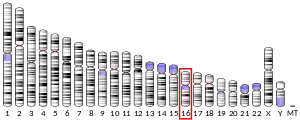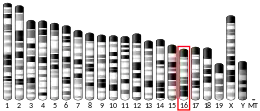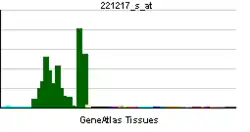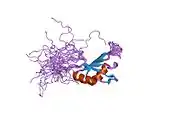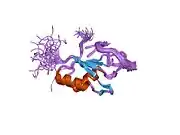RBFOX1
Fox-1 homolog A, also known as ataxin 2-binding protein 1 (A2BP1) or hexaribonucleotide-binding protein 1 (HRNBP1) or RNA binding protein, fox-1 homolog (Rbfox1), is a protein that in humans is encoded by the RBFOX1 gene.[5]
| RBFOX1 | |||||||||||||||||||||||||||||||
|---|---|---|---|---|---|---|---|---|---|---|---|---|---|---|---|---|---|---|---|---|---|---|---|---|---|---|---|---|---|---|---|
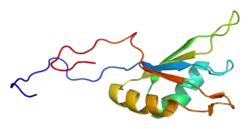 | |||||||||||||||||||||||||||||||
| |||||||||||||||||||||||||||||||
| Identifiers | |||||||||||||||||||||||||||||||
| Aliases | RBFOX1, 2BP1, A2BP1, FOX-1, FOX1, HRNBP1, RNA binding protein, fox-1 homolog 1, RNA binding fox-1 homolog 1 | ||||||||||||||||||||||||||||||
| External IDs | OMIM: 605104 MGI: 1926224 HomoloGene: 69339 GeneCards: RBFOX1 | ||||||||||||||||||||||||||||||
| |||||||||||||||||||||||||||||||
| |||||||||||||||||||||||||||||||
| |||||||||||||||||||||||||||||||
| |||||||||||||||||||||||||||||||
| Wikidata | |||||||||||||||||||||||||||||||
| |||||||||||||||||||||||||||||||
Function
Rbfox1 has an RNA recognition motif that is highly conserved among RNA-binding proteins. Rbfox1, and the related protein Rbfox2, bind the consensus RNA sequence motif (U)GCAUG within introns to exert their functions as alternative splicing factors.[6][7]
Additionally, the Rbfox1/A2BP1 protein binds to the C-terminus of ataxin-2, and may contribute to the restricted pathology of spinocerebellar ataxia type 2 (SCA2). Ataxin-2 is the gene product of the SCA2 gene which causes familial neurodegenerative diseases. Several alternatively spliced transcript variants have been found for this gene. Some of these variants localize to the nucleus and some other to the cytoplasm. Nuclear variants have a well-established role in tissue specific alternative splicing.[8] Rbfox1 cytoplasmic variants modulate mRNA stability and translation.[9][10] In stressed cells, Rbfox1 has been demonstrated to localize to cytoplasmic stress granules.[11][12]
See also
References
- GRCh38: Ensembl release 89: ENSG00000078328 - Ensembl, May 2017
- GRCm38: Ensembl release 89: ENSMUSG00000008658 - Ensembl, May 2017
- "Human PubMed Reference:". National Center for Biotechnology Information, U.S. National Library of Medicine.
- "Mouse PubMed Reference:". National Center for Biotechnology Information, U.S. National Library of Medicine.
- "Entrez Gene: A2BP1 ataxin 2-binding protein 1".
- Jin, Y. (2003-02-17). "A vertebrate RNA-binding protein Fox-1 regulates tissue-specific splicing via the pentanucleotide GCAUG". The EMBO Journal. 22 (4): 905–912. doi:10.1093/emboj/cdg089. ISSN 1460-2075. PMC 145449. PMID 12574126.
- Ponthier, Julie L.; Schluepen, Christina; Chen, Weiguo; Lersch, Robert A.; Gee, Sherry L.; Hou, Victor C.; Lo, Annie J.; Short, Sarah A.; Chasis, Joel A.; Winkelmann, John C.; Conboy, John G. (2006-03-14). "Fox-2 Splicing Factor Binds to a Conserved Intron Motif to Promote Inclusion of Protein 4.1R Alternative Exon 16". Journal of Biological Chemistry. 281 (18): 12468–12474. doi:10.1074/jbc.m511556200. ISSN 0021-9258. PMID 16537540.
- Kuroyanagi H (2009). "Fox-1 family of RNA-binding proteins". Cellular and Molecular Life Sciences. 66 (24): 3895–907. doi:10.1007/s00018-009-0120-5. PMC 2777236. PMID 19688295.
- Carreira-Rosario, Arnaldo; et al. (7 March 2016). "Repression of Pumilio Protein Expression by Rbfox1 Promotes Germ Cell Differentiation". Dev. Cell. 36 (5): 562–571. doi:10.1016/j.devcel.2016.02.010. PMC 4785839. PMID 26954550.
- Lee JA, Damianov A, Lin CH, Fontes M, Parikshak NN, Anderson ES, Geschwind DH, Black DL, Martin KC (2016). "Cytoplasmic Rbfox1 Regulates the Expression of Synaptic and Autism-Related Genes". Neuron. 89 (1): 113–28. doi:10.1016/j.neuron.2015.11.025. PMC 4858412. PMID 26687839.
- Park, Chungoo; Choi, Sunkyung; Kim, Yong-Eun; Lee, Siyeo; Park, Su-Hyung; Adelstein, Robert S.; Kawamoto, Sachiyo; Kim, Kee K. (2017-09-11). "Stress Granules Contain Rbfox2 with Cell Cycle-related mRNAs". Scientific Reports. 7 (1): 11211. Bibcode:2017NatSR...711211P. doi:10.1038/s41598-017-11651-w. ISSN 2045-2322. PMC 5593835. PMID 28894257.
- Jain, Saumya; Wheeler, Joshua R.; Walters, Robert W.; Agrawal, Anurag; Barsic, Anthony; Parker, Roy (2016-01-28). "ATPase-Modulated Stress Granules Contain a Diverse Proteome and Substructure". Cell. 164 (3): 487–498. doi:10.1016/j.cell.2015.12.038. ISSN 1097-4172. PMC 4733397. PMID 26777405.
Further reading
- Gallagher TL, Arribere JA, Geurts PA, Exner CR, McDonald KL, Dill KK, Marr HL, Adkar SS, Garnett AT, Amacher SL, Conboy JG (November 2011). "Rbfox-regulated alternative splicing is critical for zebrafish cardiac and skeletal muscle functions". Developmental Biology. 359 (2): 251–61. doi:10.1016/j.ydbio.2011.08.025. PMC 3521583. PMID 21925157.
- Shibata H, Huynh DP, Pulst SM (May 2000). "A novel protein with RNA-binding motifs interacts with ataxin-2". Human Molecular Genetics. 9 (9): 1303–13. doi:10.1093/hmg/9.9.1303. PMID 10814712.
- Kiehl TR, Shibata H, Vo T, Huynh DP, Pulst SM (August 2001). "Identification and expression of a mouse ortholog of A2BP1". Mammalian Genome. 12 (8): 595–601. doi:10.1007/s00335-001-2056-4. PMID 11471052. S2CID 7340712.
- Underwood JG, Boutz PL, Dougherty JD, Stoilov P, Black DL (November 2005). "Homologues of the Caenorhabditis elegans Fox-1 protein are neuronal splicing regulators in mammals". Molecular and Cellular Biology. 25 (22): 10005–16. doi:10.1128/MCB.25.22.10005-10016.2005. PMC 1280273. PMID 16260614.
- Auweter SD, Fasan R, Reymond L, Underwood JG, Black DL, Pitsch S, Allain FH (January 2006). "Molecular basis of RNA recognition by the human alternative splicing factor Fox-1". The EMBO Journal. 25 (1): 163–73. doi:10.1038/sj.emboj.7600918. PMC 1356361. PMID 16362037.
- Ponthier JL, Schluepen C, Chen W, Lersch RA, Gee SL, Hou VC, Lo AJ, Short SA, Chasis JA, Winkelmann JC, Conboy JG (May 2006). "Fox-2 splicing factor binds to a conserved intron motif to promote inclusion of protein 4.1R alternative exon 16". The Journal of Biological Chemistry. 281 (18): 12468–74. doi:10.1074/jbc.M511556200. PMID 16537540.
- Lim J, Hao T, Shaw C, Patel AJ, Szabó G, Rual JF, Fisk CJ, Li N, Smolyar A, Hill DE, Barabási AL, Vidal M, Zoghbi HY (May 2006). "A protein-protein interaction network for human inherited ataxias and disorders of Purkinje cell degeneration". Cell. 125 (4): 801–14. doi:10.1016/j.cell.2006.03.032. PMID 16713569. S2CID 13709685.
- Zhou HL, Baraniak AP, Lou H (February 2007). "Role for Fox-1/Fox-2 in mediating the neuronal pathway of calcitonin/calcitonin gene-related peptide alternative RNA processing". Molecular and Cellular Biology. 27 (3): 830–41. doi:10.1128/MCB.01015-06. PMC 1800674. PMID 17101796.
